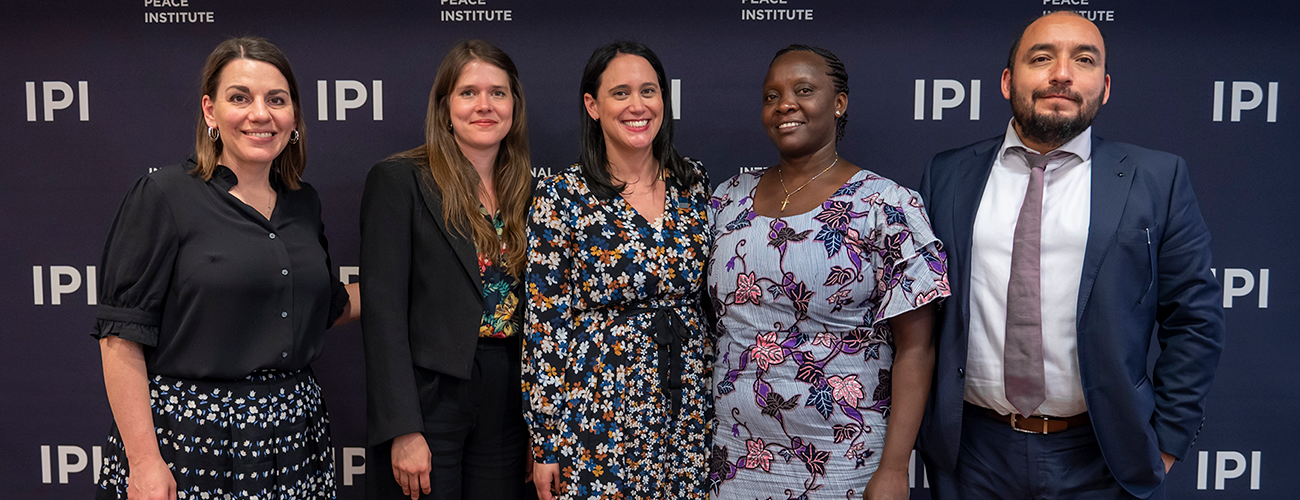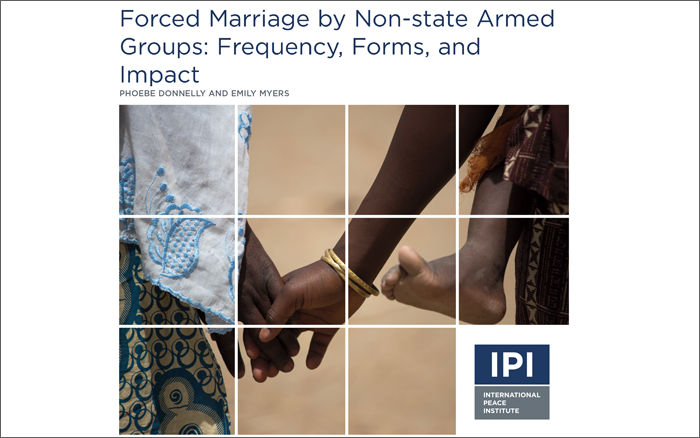Forced marriage is a distinct form of conflict-related sexual violence (CRSV) used strategically by armed groups. Although recent rulings at the International Criminal Court (ICC), such as the case of The Prosecutor v. Dominic Ongwen, have built precedent for charging and convicting non-state armed groups with forced marriage as a distinct form of crime against humanity, policymakers and practitioners have more work to do to prevent and address the long-term impacts of forced marriage. Forced marriage not only directly affects forced wives (and their children) but also harms entire communities. Forced marriage can lead to cycles of violence and have negative repercussions on human security, including livelihoods, education, and health in communities.
IPI and UN Women cohosted a policy forum on April 19th to discuss the forms and impacts of forced marriage and provide key recommendations for policymakers and practitioners to address gaps, broaden perceptions, and disrupt binaries. This event launched a novel dataset documenting the use of forced marriage by non-state armed groups by IPI’s Head of Women, Peace and Security Program Phoebe Donnelly and PhD Candidate in Political Science at Duke University Emily Myers.
Pauline Brosch of UN Women provided a policy perspective and touched on strategies that the international community can take to better address forced marriage and other forms of conflict-related sexual violence. Teddy Atim of the Feinstein International Center, a practitioner and researcher of humanitarian emergencies and post-conflict settings, drew on examples of recovery from forced marriage in Northern Uganda to highlight multiplier effects, such as the likelihood of conflict-related sexual violence survivors experiencing ongoing violations in return communities.
The event aimed to help member states and UN officials align policies related to conflict-related sexual violence, like forced marriage, with the data and realities on the ground. Survivors must always have a seat at the table: “We can only address the root cause of forced marriage and other forms of conflict-related sexual violence if we involve survivors,” emphasized Victoria Nyanjura founder of Women in Action for Women and survivor of forced marriage.
In light of the discussions at the event, it is clear that there is a need for increased capacity and accountability. Forced marriage is a chronic feature of the political economy of war and takes place in contexts where rule of law has collapsed due to protracted conflict and instability, affirmed Alejandro Sánchez of the Office of the Special Representative of the Secretary-General on Sexual Violence in Conflict.
The launch event took place a day before the conference entitled “Catalyzing Change: Ongwen, Sexual and Gender-Based Crimes, and Intersectional Feminist Practice in International Criminal Justice.” This conference, hosted by the Cardozo Law Institute in Holocaust and Human Rights, in partnership with UN Women and others, analyzed the impact of the ICC case The Prosecutor v. Dominic Ongwen on the treatment of forced marriage (and other sexual and gender-based crimes) in international law. Panelists at this conference included civil society and legal experts from Uganda, who were able to connect with key stakeholders in the UN community at IPI’s event.
Opening Remarks:
Jenna Russo, Director of Research and Head of the Center for Peace Operations, International Peace Institute
Speakers:
Phoebe Donnelly, Senior Fellow and Head of Women, Peace, and Security Program, International Peace Institute
Emily Myers, PhD Candidate in Political Science at Duke University and National Science Foundation Graduate Research Fellow (virtual)
Teddy Atim, Visiting Fellow at the Feinstein International Center, Tufts University
Pauline Brosch, Policy Analyst, Peace and Security, UN Women
Victoria Nyanjura, Founder, Women in Action for Women (WAW)
Alejandro Sánchez, Deputy Team Leader, Programmes and Communications, Office of the Special Representative of the Secretary-General on Sexual Violence in Conflict
Moderator:
Jenna Russo, Director of Research and Head of the Center for Peace Operations, International Peace Institute









